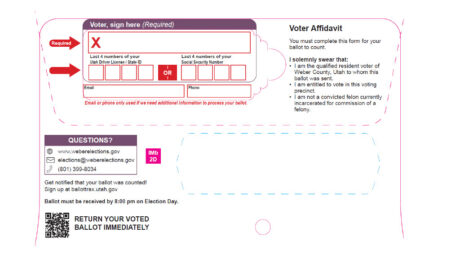Judge weighing dismissal motion in Ogden false arrest suit
OGDEN — The attorney for a Harrisville man who was arrested and later exonerated in an Ogden bank robbery case alleges that the police probable cause statement contained misleading, vague and false information.
But an attorney representing two Ogden Police Department detectives says the man’s civil lawsuit should be dismissed because the misidentification was an innocent mistake and they are protected by governmental immunity.
Kerry Maw, 48 at the time, was arrested after the June 4, 2019, robbery at the Wells Fargo Bank branch at 4301 Harrison Blvd. Ogden police said in a probable cause statement that a bank surveillance photo and Maw’s driver license photo showed a “unique” similarity between the ear structures. But charges were dropped about three weeks later after the bank was robbed again and police identified a man who admitted to committing both robberies.
In dueling court filings recently, the two sides made arguments to U.S. District Judge Bruce Jenkins in Salt Lake City over a possible summary judgment ruling in the case. Jenkins may decide to dismiss the suit, decide in favor of Maw, or the case will proceed to trial or a settlement.
Maw’s attorney, Randall Phillips, said in his Jan. 16 filing that closer examination of the ears would have exonerated Maw. Glasses worn by the robber and by Maw in a Facebook photo were not similar, as detectives claimed, Phillips argued. Further, the robber had a cleanly shaven chin but Maw, in his jail booking photo, had a minimal goatee.
Additionally, Phillips assailed a passage in the probable cause statement that said the Harrisville police chief and Maw’s ex-wife had identified Maw as the robber. In later court depositions, the chief testified he had not identified Maw as the robber, but only suggested to Ogden police that they talk to Maw’s ex-wife. The ex-wife said she did not talk to detectives until the next day, after the probable cause statement was filed and Maw had been arrested.
In other deposition testimony, a cousin of Maw said she told police that Maw was with her at the time of the robbery, but that a detective rebuffed her. According to a transcript of their conversation in the court record, the detective told the cousin, “So here’s, here’s the thing. If you’re saying that he was with you the entire time, we have physical evidence that it’s not, and therefore the things that you would be telling us would be obstructing our case and trying to impede or redirect our case.”
Phillips also criticized police for not working to identify a Dodge pickup truck seen in bank surveillance video after the first robbery. They did review footage after the second robbery, seeing the same truck. That led them to Anthony Thomas Murdzak, of Logan, who was then convicted of both robberies.
Attorney Matthew Church, representing the detectives, said the lead detective on the case, Travis Kearl, “believed that there were physical similarities between the robbery suspect and Maw” after comparing the bank surveillance photos with photos of Maw, including his driver license photo.
“It was completely reasonable for the officers to use and rely on Maw’s friends and family’s identification,” Church wrote. “Even if Maw believes that the officers made a mistake, allegations of negligence or innocent mistake are insufficient” to overcome a qualified immunity standard that protects police.
“Qualified immunity is intended to give officials ‘breathing room to make reasonable but mistaken judgments,'” Church wrote, quoting federal court precedent on the immunity.
“The standard to sue officers for this type of claim is very high. It requires more than just facts establishing that the officers were imperfect,” according to Church’s filing. “It requires ‘proof that the (officer) seeking the warrant knew that the challenged information was false or that he had a reckless disregard for its truthfulness.'”
In any case, Church said, “Maw spent only a few hours in custody and the charges were dropped before any court appearances.”
But in his suit, Maw said a “viral” police social media posting of his arrest generated widespread publicity that today still haunts him. The suit seeks damages for physical and mental pain and suffering; loss of business, opportunities and reputation; financial devastation; and other effects.
- Kerry Maw, of Harrisville, in an undated photo. Maw has filed suit accusing Ogden police of falsely arresting him after a 2019 Ogden bank robbery. Maw was exonerated and a Logan man was arrested and convicted.
-
Murdzak
- Kerry Maw’s jail booking photo (left) and a bank surveillance photo of the man who robbed an Ogden bank in 2019. Maw later was exonerated and is suing Ogden police for relying on the photos to establish probable cause for arrest.








